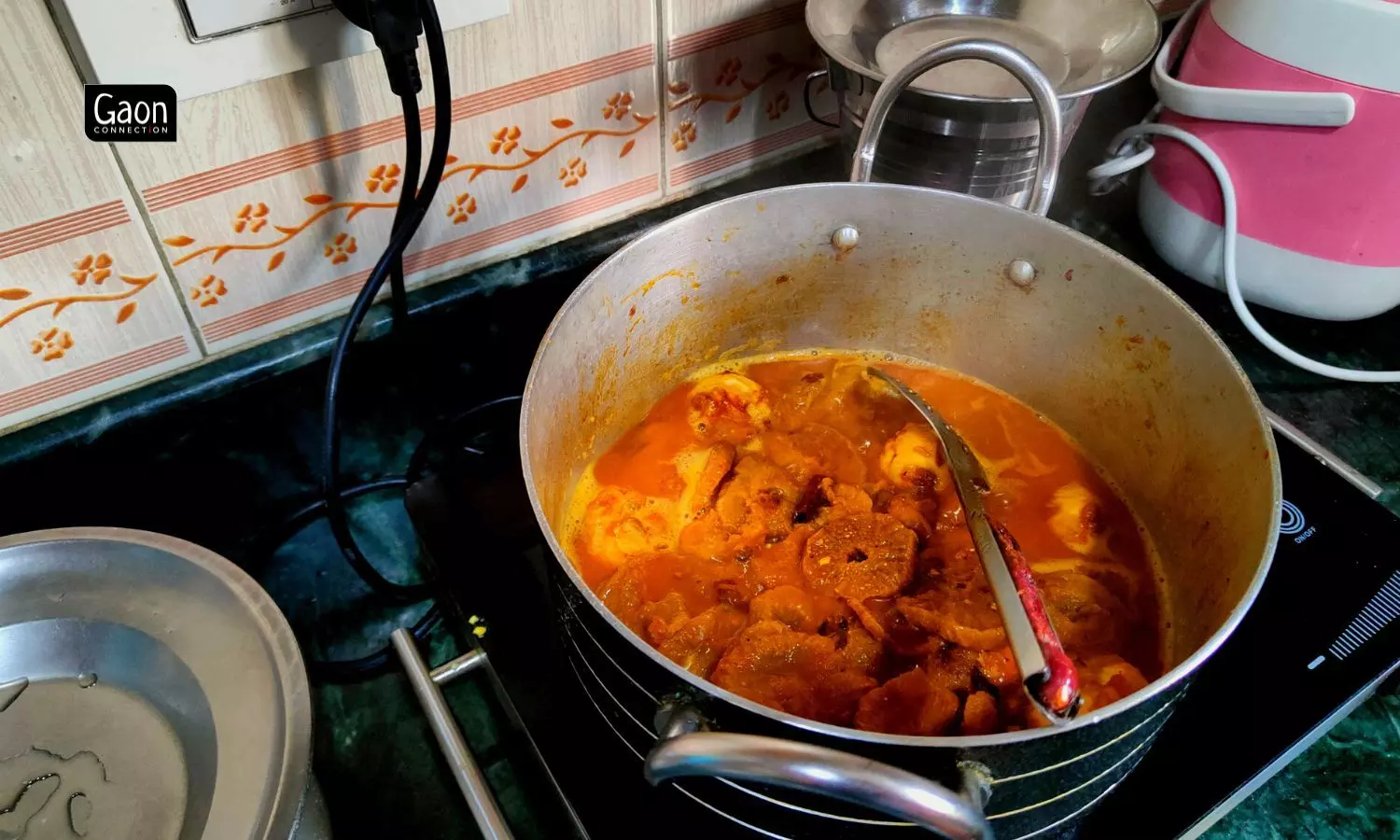Srinagar, J&K
Even as recently as fifteen years ago, the kitchen of Khadija Begum of Old City, Srinagar would have kilos and kilos of vegetables that she had dried during the summers so that she could use them in the harsh winters of Kashmir.
The 55-year-old would bring out the tomatoes, gourd, spinach, turnip, lotus stem, and brinjal every morning in the months between April and October, when there was sunshine, then put them away at night. The vegetables would dry in the sunlight and they would be stored and taken out to be cooked in the cold, clammy winters when fresh vegetables could only be dreamt of.
“We call them Hokh Syun, which means dried vegetables. We would cook them in copper utensils and serve them,” Khadija told Gaon Connection, who has two sons and a daughter in the family.
In the days gone by, winters in Kashmir meant being cut off from the rest of the world. “Everything was blanketed in snow and roads were unusable. So families ensured they had enough foodstuff stored to last them through the winter months,” Khadija said as she worked in her kitchen (made of wood and cement) with open shelves lined with utensils.

After they were dry, Kashmiri women stored them in jute bags or cloth bags in the kitchen or even in their rooms.
Dried vegetables have been consumed in Kashmir for centuries. Heavy snowfall on the Srinagar-Jammu National Highway meant no transport could pass through and food grains and vegetables were used prudently. Drying the vegetables when they were available ensured there was nutritious food even when they were cut off from the rest of the world.
Also Read: It’s chillai kalan in J&K and here are some traditional Dogra recipes to keep you warm
“We sliced the vegetables thinly, threaded them into garlands and hung them up on walls and on the roof to dry in the sun. Every night, once the sun went down, we brought the vegetables in. It was very important as we did not want any dew falling on them that could lead to fungus, explained Khadija.
After they were dry, Kashmiri women stored them in jute bags or cloth bags in the kitchen or even in their rooms. “We hung them up on the walls so that they had enough ventilation and at the same time remained dry. People in far flung areas of north and south Kashmir still do this,” she added.
The most commonly stored vegetables include dried brinjal that is called Wangan Hachi, Ale Hachi that is dried gourd, Gogji Aer is dried turnips, and Ruwangan Hachi is dried tomatoes. These dried vegetables can be cooked separately or in a combination with meat, chicken, eggs, daals, and cheese.
According to Imran Ahmad, a Srinagar based physician, “There is no harm in consuming dried vegetables. However, people should not use any chemicals to preserve them. If they are not properly dried, then they could attract fungus that is harmful to health.”
What was once commonplace has become rare. “It is the price of progress,” said Kashmir’s noted poet and writer Zareef Ahmad Zareef. “Fresh vegetables are available throughout the year. Farmers in Kashmir grow them too in green houses. The highways and airports remain open in winters, so there is no problem in supply of fresh produce,” he pointed out. On a more sombre note, Kashmir has begun to receive less snowfall, he said.
Those were the days when people huddled indoors through the cold months, next to their bukharis, not daring to venture out. Not any more. “There is no restriction of movement at all these days, barring perhaps a day or two here and there. And Hokh Syun will soon disappear,” Zareef feared.
Zareef however said there are still some shops in Old City Srinagar and in the villages of North and South Kashmir where people sell dried vegetables.
Also Read: Corn rotis and kahwa: Tea time in Kashmir’s Doodhpathri
Mushtaq Ahmad from South Kashmir’s Anantnag district sells Hokh Syun. “While it is true that fresh vegetables are available throughout the year now, there are still some people who crave the flavour and texture of the dried vegetables,” he said.
The dried vegetables sell at anything between Rs 100 and Rs 300 a kilogram depending on the demand and supply. “Sometimes, a kilo of dried gourd costs Rs 200, sometimes it is Rs 150. It all depends upon the demand. Most of the customers of dried vegetables are over 45 years of age who grew up with Hokh Syun and still crave them,” he smiled.
Many young Kashmiris when they visit home, carry back Hokh Syun with them. There are so many varieties and it reminds them of home.
****************
During the summers, my mother used to cut Ale Hachi (gourd) into different slices before spreading them over wooden or plastic trays to dry for a few weeks till all the moisture dried up.

Here Ale Hachi is being cooked after draining the water, the pieces are fried in oil.
Then she threaded them into long garlands and hung them upon walls where the sunrays fell. When she was absolutely certain it was dry, she packed them in cloth bags where they could breathe.
Recipe of Ale Hachi
- Clean the Ale Hachi with hot water well and ensure there is no dust or insect on it.
- Soak it in a bowl of hot water for half an hour to rehydrate it.
- Drain the water and fry the pieces in oil.
- Cook them in a pressure cooker with a little water salt, turmeric, coriander, chilli powder, cardamom and ginger.
- The cooked vegetable can then be added to sauted meat or chicken, and cooked on low heat till everything is well cooked.
- Serve hot with rice.


















